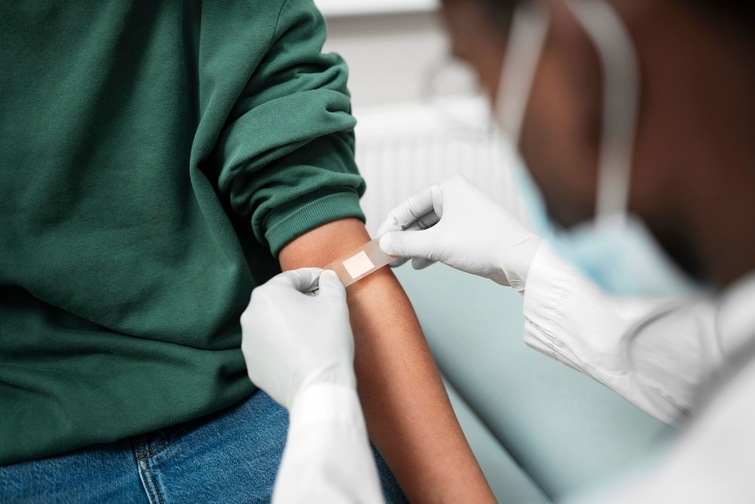
By 2030, the annual number of people traveling internationally will reach 1.8 billion. As more people travel abroad to a wider variety of destinations, there is an increasing risk of acquiring infectious diseases not found in their home countries. Traveling to new places can be exciting, but it also comes with health risks; visiting an urgent care center in West Hartford, CT, for your vaccination can significantly lower your chances of getting infections so that you can enjoy your trip.
Travel vaccinations protect travelers from infectious diseases in certain parts of the world. These vaccines prepare your immune system to fight specific viruses or bacteria you might encounter while traveling. Getting vaccinated reduces the risk of contracting severe illnesses that could spoil your trip and cause long-term health issues. Travel vaccinations are crucial to pre-travel health planning, ensuring you stay healthy and safe during your travels. At urgent care in West Hartford, CT, you can receive travel vaccinations tailored to your destination.
When planning a trip, especially to an international destination, you must protect yourself against various diseases. Urgent care in West Hartford, CT, can help you determine your necessary vaccinations. Here’s how to know if you need travel vaccinations:
1. Routine Vaccines
Routine vaccines are the standard immunizations recommended for all children and adults in the U.S. These include vaccines for diseases like measles, mumps, rubella, tetanus, diphtheria, and pertussis. Many people may not be current on these vaccinations, making travel a good time to catch up. Diseases well-controlled in the U.S., such as measles, can be common in other countries. Ensuring you’re current on routine vaccines helps protect you and prevent outbreaks abroad.
2. Recommended Vaccines
Recommended vaccines are travel-specific immunizations that protect you from diseases prevalent in certain areas. These vaccines are not part of the routine immunization schedule but are advised based on your travel destination.
Vaccines for hepatitis A and typhoid may be recommended if traveling to areas with poor sanitation. By getting these vaccines, you reduce your risk of contracting illnesses that could disrupt your trip and help prevent the spread of diseases from one country to another.
3. Required Vaccines
Some destinations require proof of specific vaccinations for entry. For instance, the yellow fever vaccine is mandatory for travel to certain parts of Africa and South America. Saudi Arabia requires the meningococcal vaccine for travelers during the hajj, the annual pilgrimage to Mecca. These requirements are in place to prevent the spread of highly contagious diseases and protect public health.
Determining which vaccinations you need is crucial for your health when planning for travel. Various factors play into this decision, and understanding each with the help of urgent care in West Hartford, CT, is essential for making the right choices.
1. Destination: The country or region you visit determines the necessary vaccinations. For example, yellow fever is common in parts of Africa and South America, while Japanese encephalitis is a concern in rural Asia. Research your destination or consult healthcare providers at urgent care in West Hartford, CT, to understand specific health risks.
2. Duration of Stay: The length of your trip affects your exposure to diseases. Short-term travelers might need fewer vaccinations than those on longer stays. Consider the duration of your stay to assess your vaccination needs accurately.
3. Activities Planned: Your activities can impact the vaccinations required. Adventurous activities like hiking or camping in rural areas increase health risks compared to urban hotels. Inform your healthcare provider at urgent care in West Hartford, CT, about your itinerary for tailored advice.
4. Your Current Health and Immunization History: Your health status and past immunizations are crucial. If you have medical conditions or are not current with routine vaccines, you may need additional travel vaccinations. Discuss your health history with providers at urgent care in West Hartford, CT, for comprehensive protection during your travels.

Hepatitis A is a liver infection caused by the hepatitis A virus (HAV). It spreads through ingesting contaminated food or water and close contact with an infected person. Symptoms include fatigue, nausea, stomach pain, and jaundice (yellowing of the skin and eyes). The disease can last from a few weeks to several months, but it usually doesn’t lead to long-term liver damage.
The hepatitis A vaccine is highly effective and usually given in two doses. The first dose is administered at least two weeks before travel, providing initial protection. The second dose is given six months later for long-term immunity. For those who need immediate protection, immune globulin can be given alongside the first dose.
Hepatitis A is prevalent in many parts of the world, especially in regions with poor sanitation. This includes parts of Africa, Asia, Central and South America, and Eastern Europe. Travelers to these areas should ensure they are vaccinated. Urgent care in West Hartford, CT, can provide vaccinations and advice for safe travel.
Hepatitis B is a severe liver infection caused by the hepatitis B virus (HBV). It spreads through contact with infectious body fluids, such as blood and semen. Symptoms range from mild illness to severe liver disease, including cirrhosis and liver cancer. Chronic hepatitis B can lead to long-term health problems.
The hepatitis B vaccine is typically given in three doses over six months. The first dose is followed by the second one month later and the third six months after the first. An accelerated dosing schedule is available for those on a tight schedule. Urgent care in West Hartford, CT, offers this vaccination to protect travelers.
Hepatitis B is widespread in Sub-Saharan Africa, East Asia, and parts of South America and Eastern Europe. Travelers to these areas are at higher risk and should be vaccinated. Consulting with urgent care in West Hartford, CT, can help determine the need for this vaccination based on travel plans.
Typhoid fever is a bacterial infection caused by Salmonella typhi. It spreads through contaminated food and water. Symptoms include high fever, weakness, stomach pain, headache, and loss of appetite. If untreated, it can lead to severe complications.
The typhoid vaccine is available in two forms: an injectable and oral. The injectable vaccine is given as a single shot at least two weeks before travel, while the oral vaccine is taken in four capsules over a week. Both vaccines protect for several years.
Typhoid fever is common in areas with poor sanitation, including parts of South Asia, Africa, the Caribbean, and Central and South America. Annually, it is estimated that typhoid fever results in approximately 11.9 to 26.9 million cases worldwide, leading to about 129,000 to 216,510 fatalities. Travelers to these regions should consider getting vaccinated in urgent care in West Hartford, CT, to prevent contracting this deadly disease.
Yellow fever is a viral infection transmitted by mosquitoes. It is found in tropical and subtropical areas of Africa and South America. Symptoms include fever, chills, headache, back pain, and jaundice. Severe cases can cause liver damage, bleeding, and organ failure.
The yellow fever vaccine is a single-dose injection that provides lifelong protection for most people. It should be given at least 10 days before travel to endemic areas. Some countries require proof of yellow fever vaccination for entry.
Yellow fever is endemic in certain areas of Africa and South America. Travelers to these regions are at risk and should be vaccinated. Consulting with urgent care in West Hartford, CT, can ensure proper vaccination and adherence to travel requirements.
Japanese encephalitis is a viral brain infection spread by mosquitoes. It is most common in rural areas of Asia and the Western Pacific. Symptoms range from mild fever and headache to severe encephalitis, which can cause brain damage and death.
The Japanese encephalitis vaccine is given in two doses, spaced 28 days apart. The first dose should be administered at least one month before travel, with the second dose providing long-term protection.
Japanese encephalitis is prevalent in rural and agricultural areas of India, China, Japan, and Southeast Asia. Travelers to these regions should consider vaccination.
Rabies is a deadly viral infection that affects the nervous system. It is transmitted through the bite or scratch of an infected animal. Early symptoms include fever, headache, and tingling at the exposure site. If untreated, it progresses to severe neurological symptoms and death.
The rabies vaccine is administered in three shots over 28 days. Pre-exposure vaccination is recommended for travelers to high-risk areas, and post-exposure treatment involves additional doses. Urgent care in West Hartford, CT, provides pre- and post-exposure vaccinations.
Rabies is found worldwide but is more common in regions with stray animals, such as parts of Asia, Africa, and Central and South America. Travelers engaging in activities like hiking or animal handling are at higher risk. Urgent care in West Hartford, CT, can assess risk and provide appropriate vaccinations.
Meningococcal disease is a severe bacterial infection causing meningitis and sepsis. It spreads through respiratory droplets. Symptoms include fever, headache, stiff neck, and rash. It can be fatal or cause long-term disabilities.
The meningococcal vaccine is given as a single dose. It is recommended for travelers visiting areas with outbreaks or where the disease is common. Urgent care in West Hartford, CT, provides this vaccination for at-risk people.
Meningococcal disease is common in the “meningitis belt” of sub-Saharan Africa and parts of Saudi Arabia during Hajj. Travelers to these areas should get vaccinated. Urgent care in West Hartford, CT, offers vaccinations and travel health advice.
Polio is a viral infection that can cause paralysis and death. It spreads through contaminated water and food. Symptoms range from mild flu-like illness to severe muscle weakness and paralysis.
The polio vaccine is given in multiple doses, usually starting in childhood. A booster dose is recommended for travelers traveling to areas with polio transmission. Urgent care in West Hartford, CT, can provide booster shots.
Polio remains a concern in parts of Afghanistan, Pakistan, and some African countries. Travelers to these regions should ensure they are fully vaccinated.

Not every trip requires the same vaccinations. The vaccines you need depend on your destination, the length of your stay, and your planned activities. For example, if you’re traveling to a country with a high risk of hepatitis A, you’ll need that vaccine. But if you’re visiting a country with common yellow fever, you’ll need a vaccination. Your health is also a factor. Some people may need extra vaccines due to age or existing medical conditions. Healthcare providers at an urgent care in West Hartford, CT, can help you determine the proper vaccinations for your trip.
Travel vaccination coverage varies by insurance plan. Some plans may cover the cost of vaccines recommended by health authorities, while others may not. It’s a good idea to check with your insurance provider before scheduling your vaccinations. The staff at urgent care in West Hartford, CT, can help you understand what your insurance covers and provide cost-effective options for any vaccines that might not be covered.
Yes, but it’s important to consult with a healthcare provider first. Certain medical conditions may affect how you respond to vaccines or require special precautions. For example, people with weakened immune systems may need different vaccine schedules or dosages. Doctors in urgent care in West Hartford, CT, can review your medical history and recommend the safest and most effective vaccination plan for your needs.
If you miss a dose of a vaccine, it’s important to get back on track as soon as possible. Some vaccines require multiple doses to provide full protection. Missing a dose can leave you vulnerable to illness. Contact your urgent care in West Hartford, CT, for advice on proceeding. They can help you reschedule missed doses and ensure you stay protected.
You can receive combined vaccinations from your urgent care in West Hartford, CT, such as the hepatitis A and typhoid vaccines. The typhoid vaccine should be received at least one month before traveling; however, it can be administered closer to your departure if necessary. For ongoing protection, booster shots are advised every three years for those still at risk of exposure.
Ready to get your travel vaccinations? Today, schedule an appointment with DOCS Urgent Care – West Hartford. Our experienced healthcare providers make getting the vaccines you need for a safe and healthy trip easy.
We offer convenient appointment times and personalized care to ensure you’re fully prepared for your travels. Contact us or visit our website to book your appointment now.
Let DOCS Urgent Care – West Hartford help you stay protected on your next adventure!


During this surge in COVID-19 cases, our primary focus is meeting the high demand for tests, and we are seeing higher than usual wait times. This means we are unable to answer most phone calls. Please know that our teams are working very hard during this time to care for as many patients as safely as possible. Please click the button below for answers to common questions. We appreciate your understanding.